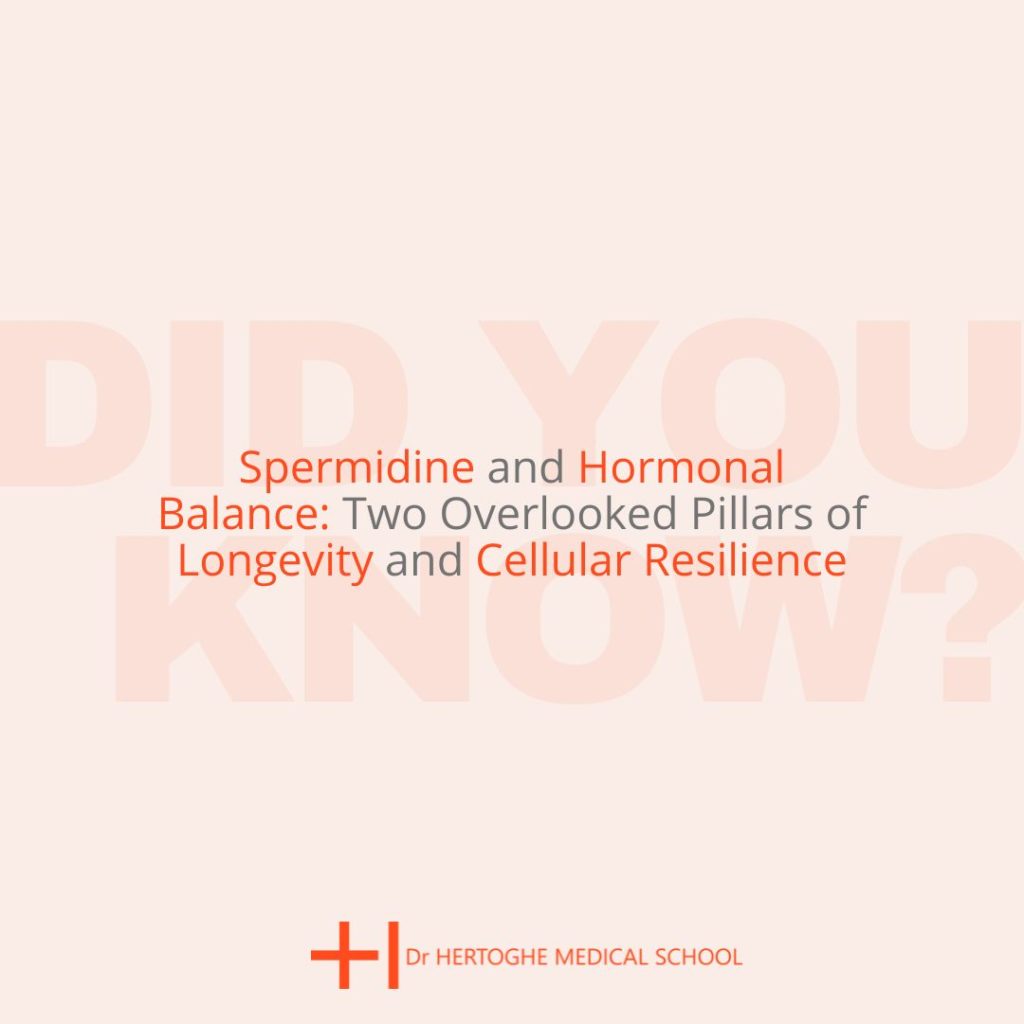Spermidine and Hormonal Balance: Two Overlooked Pillars of Longevity and Cellular Resilience

Among the most promising recent discoveries in the field of longevity, spermidine is attracting growing scientific attention. Naturally produced by the body, this polyamine declines with age—precisely when its cellular benefits become increasingly valuable. Spermidine plays a key role in maintaining cellular health by activating autophagy and mitophagy, two essential processes that allow cells to clean themselves and renew their components. Through these mechanisms, damaged cellular structures are eliminated, toxic waste is prevented from accumulating, and reusable elements are recycled. The result is enhanced cellular vitality and a slower pace of aging.
But the effects of spermidine go well beyond basic cellular maintenance. Recent studies suggest that increasing spermidine intake may benefit the aging brain. In older individuals, especially those experiencing mild to moderate cognitive decline, spermidine has been shown to improve memory and other cognitive functions. This effect may be due to its ability to promote the clearance of amyloid plaques and support neurogenesis—fostering the growth of new neurons.
Spermidine also appears to protect cardiovascular health by improving the function of heart cells. It stimulates mitophagy, which enables cardiac cells to eliminate defective mitochondria. This action helps preserve the elasticity and strength of heart tissue, potentially reducing the risk of age-related cardiovascular disease. Although spermidine is naturally found in wheat germ, mushrooms, and whole grains, modern diets often provide insufficient amounts. Supplementation is therefore increasingly considered, especially since clinical trials have highlighted its excellent safety profile—even among the elderly.
However, spermidine represents only one piece of a broader longevity strategy, in which hormonal balance plays a central and often underappreciated role. In clinical practice, hormone therapies are commonly used to alleviate symptoms, improve quality of life, or slow down aging. Yet emerging data suggest these therapies may serve a deeper, more fundamental function: reinforcing the body’s biological resilience—even under extreme conditions.
This idea is vividly illustrated in research involving patients diagnosed with brain death. In these cases, administration of a combination of triiodothyronine (T3) and hydrocortisone significantly extended the time between brain death and cardiac arrest. In other words, even in the complete absence of brain activity, the heart kept beating longer in patients who received hormonal support. These patients maintained more stable blood pressure, higher cardiac output, and stronger ventricular contractility than those who received no treatment. This finding points to a powerful biological reality: hormones play a critical role in preserving systemic function, even when brain activity has ceased.
Similar patterns have been observed in intensive care settings. Patients with higher levels of free T3, cortisol, or IGF-1 (insulin-like growth factor 1) consistently show better survival rates, faster recovery, and improved organ function—even in the face of severe infections or acute respiratory failure. These data suggest that proactively optimizing hormonal balance could give the body a significant advantage in coping with extreme physiological stress.
Conversely, undiagnosed or untreated hormonal deficiencies may silently compromise recovery after surgery, trauma, or intensive care hospitalization. This brings into focus a crucial insight: hormonal health should be seen as a strategic tool—not only to manage disease but also to enhance the body’s ability to survive it.
Targeted thyroid support, well-balanced adrenal function, and optimization of anabolic hormones such as growth hormone, IGF-1, or testosterone may strengthen stress responses, accelerate tissue repair, and increase the odds of survival in critical situations. This vision calls for a rethinking of preventive medicine—not just as a way to avoid illness, but as a method for building strong biological reserves capable of supporting the body through adversity.
Respecting the vital role of hormones means recognizing that they are far more than metabolic regulators—they are agents of survival. Thoughtfully integrating them into the care of vulnerable or aging patients could profoundly shift our approach to resilience, longevity, and recovery.

